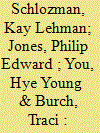|
|
|
Sort Order |
|
|
|
Items / Page
|
|
|
|
|
|
|
| Srl | Item |
| 1 |
ID:
104560


|
|
|
| 2 |
ID:
190263


|
|
|
|
|
| Summary/Abstract |
This article presents evidence that exposure to officer-involved deaths of low-threat Black victims increases political interest and voter turnout among Black respondents under age 40 to the 2016 Collaborative Multiracial Post-Election Survey. Victim race, threat level, and visibility affect the likelihood that an officer-involved death will mobilize political interest. Political interest and voter turnout are higher among the treatment group, which was exposed to high-visibility/low-threat Black victims only before participating in the CMPS, than in the control group, which was exposed to such victims only after taking the survey. Exposing young Black respondents to all victims without accounting for threat, visibility, or race does not affect political interest or voter turnout, suggesting the importance of these factors for mobilization. The findings clarify the role that Black Lives Matter activists, journalists, and watchdog groups can play in countering the police actions that shape the visibility and framing of Black victims of police violence.
|
|
|
|
|
|
|
|
|
|
|
|
|
|
|
|
| 3 |
ID:
142737


|
|
|
|
|
| Summary/Abstract |
This article documents the prevalence in organized interest politics in the United States of organizations—for example, corporations, think tanks, universities, or hospitals—that have no members in the ordinary sense and analyzes the consequences of that dominance for the democratic representation of citizen interests. We use data from the Washington Representatives Study, a longitudinal data base containing more than 33,000 organizations active in national politics in 1981, 1991, 2001, 2006, and 2011. The share of membership associations active in Washington has eroded over time until, in 2011, barely a quarter of the more than 14,000 organizations active in Washington in 2011 were membership associations, and less than half of those were membership association with individuals as members. In contrast, a majority of the politically involved organizations were memberless organizations, of which nearly two-thirds were corporations. The dominance of memberless organizations in pressure politics raises important questions about democratic representation. Studies of political representation by interest groups raise several concerns about democratic inequalities: the extent to which representation of interests by groups is unequal, the extent to which groups fail to represent their members equally, and the extent to which group members are unable to control their leaders. All of the dilemmas that arise when membership associations advocate in politics become even more intractable when organizations do not have members.
|
|
|
|
|
|
|
|
|
|
|
|
|
|
|
|
|
|
|
|
|